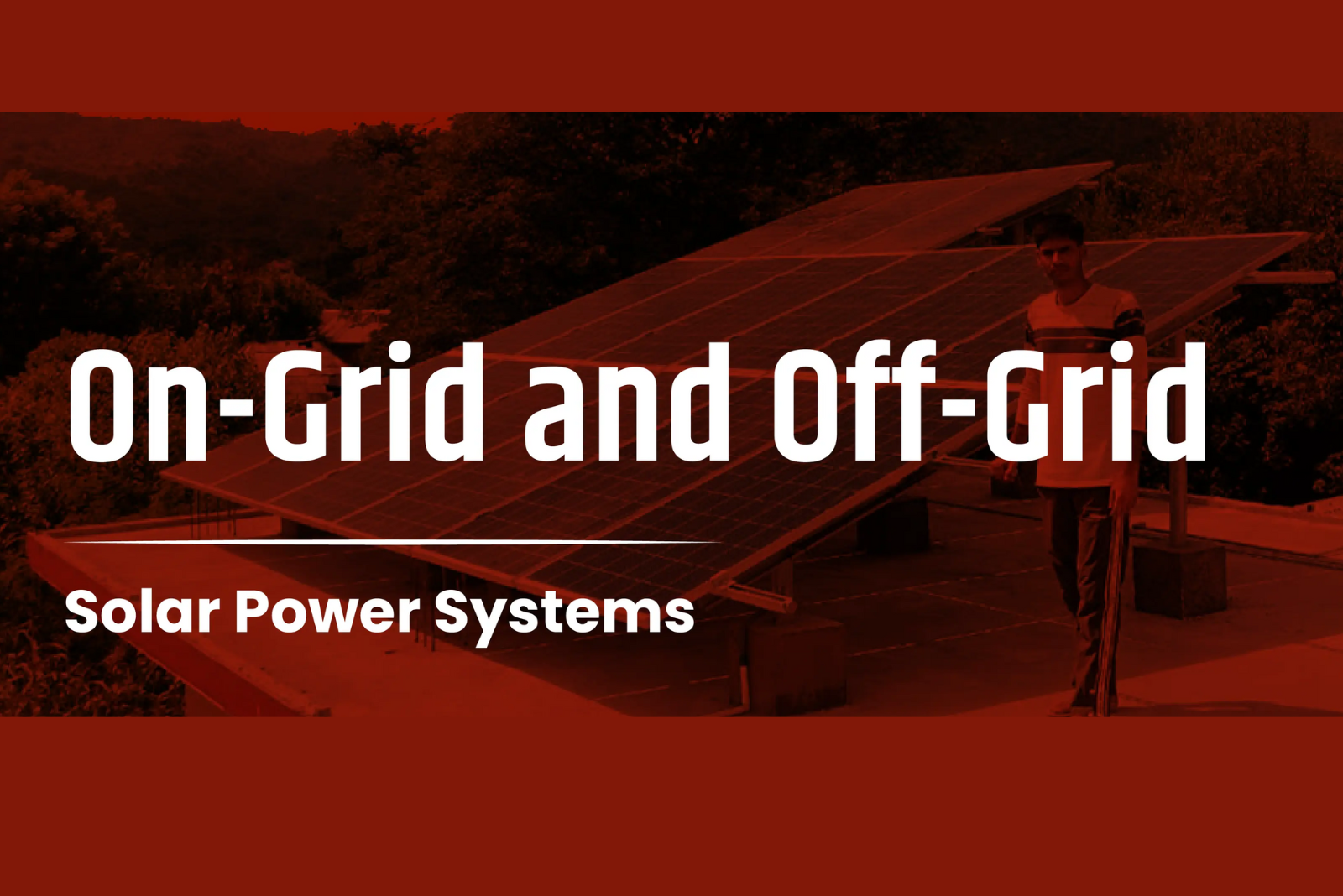On-grid vs Off-grid Solar Power System
- Home
- Blogs

Solar Energy is the form of energy that comes from the sun. There are two main types of solar energy: Photovoltaic (PV) and Solar Thermal Energy. This energy is replenished constantly, and being renewable it is proven to be eco-friendly as it does not produce any harmful or greenhouse gases. The sun’s energy is harnessed through on-grid and off-grid solar power systems that convert it into electricity or solar thermal systems that help produce heat.
The electricity generated through on-grid and off-grid solar power systems is then used for many purposes like industrial and residential uses and also for large-scale solar farms. With such solar technologies used in the right way, sustainable living becomes possible. Before we come to the workings of solar power systems, let’s go through the multiple advantages solar energy has.
What are the Advantages of Solar Energy?
- Promoting the use of solar energy helps with the reduction of carbon footprint and emissions from fossil fuels making it a more sensible and healthier option for the earth.
- Considering it is a renewable source of energy there isn t any worries of it being depleted.
- Other than the existing benefits of energy, in the long run solar power energy helps in reducing or lowering energy and power cost.
- It is practical and easy to reach since there is always an option that can be made use of at any time.
- Solar Energy ensures that the environment that humans live in is pollution free thus making it cleaner, sustainable and healthier.
What is a Solar Power System?
A solar power system is made from several components. And the first component are solar panels; these panels absorb sunlight and based on silicon cells split electrons to create direct current (DC) electricity. The inverter then converts the current to an Alternating current in order to be used in home appliances and the electric grid. If you want to Know how solar panels work kindly check out the work on solar panels”
Types of Solar Power Systems
- On-grid (Grid-tied) Solar Power System
- Off-grid Solar Power System
- Hybrid Solar Power System
What Is An On-Grid Power Supply System?
An On grid or Grid tied solar power system is usually used to connect to a primary electricity grid also known as the local electric grid.
On-grid solar power systems primarily consist of power utility grids, solar panels, and inverters.
- When the solar cells receive sunlight, they generate direct current electricity, which is then supplied to inverters that turn D.C. into A.C electric power, that can be used in homes and businesses.
- The power generated from the solar panels is consumed in the house or business first, then the surplus electricity is transferred to the Grids. When the electricity generated by the solar panels is insufficient, the power grid will be used to supply the electricity
Advantages of the Grid-tied Solar System
Carbon-Free: It is extremely sustainable as it decreases reliance on fossil fuels and in a way reduces the carbon footprint left behind.
No use of Battery Storage: There is no requirement to install and deal with the devices as all the information and support is provided on the grid.
Aid of Grid: It assists in ensuring sustainable development, restoring the extra energy transferred back to the grid and therefore enhancing the energy supply.
Economical: This is among the best economical ways of curbing our utility bills as we are producing our electricity and getting paid for surplus energy.
Uses of Grid Connect Solar Power System
Residential Buildings: It helps in servicing houses with the use of solar energy, and surplus energy generated may result to more credits, thereby lowering electricity payments.
Farming Sector: This is very useful in practicing farming activities and undertakings without worrying about incurring high electricity costs.
Industrial Units: This lowers the total expenses which are needed to perform routine activities in respectively offices, industries and huge malls and encourages environmental friendliness.
Details of Off-Grid Solar Power System
A Solar power system that works without being connected to the electricity grid is called an Off grid system. The main components of such a system are solar panels, an inverter, charge controllers, and storage batteries. Such systems are used in areas that have contrasting climates as they can operate without electricity grids. They utilize solar energy for power as well as storage batteries.
Solar panels are installed in a building’s roof. The sunlight absorbed by these panels is converted into direct current which then through the inverter is changed into alternating current and supplied to electricity panels. Hence, electricity generated through solar panels can be used at home or at the place of work.
If solar panels do not generate enough electricity due to sunlight being unavailable, the energy stored in the batteries is used. A charge controller has the function to monitor and regulate the flow of energy from the solar panels to the batteries to prevent damage.
Disadvantages of Off-Grid Solar Power System
Independency- Off grid systems do not depend on the local electricity grids and are self sufficient systems devoid from any grid failures.
Environmentally Friendly – As they completely eliminate the dependency on fossil fuels and minimize the carbon as well as other harmful emissions They only depend on renewable solar energy or storage battery for electric power, they completely do away with fossil fuels.
Cost-effective – While the installation of a solar power system could incur some initial expenses, utilities and bills are greatly minimized in the long-term.
Applicable to remote areas – Because setting up a grid system within such areas incurs high costs and is very complex, this system is quite suitable for remote or rural regions.
Where Are Off-Grid Solar Power Energy Used Most
Remote Homes – This system suits homes and cabins that are far away to access electricity through the use of grids, pretty much everywhere else would be ideal.
Rural Areas – This is a great solution for serving schools, hospitals and institutions inside rural areas where the supply of electricity is consistent.
Communication Towers – Applying efficient Off-grid solar power system helps in continuous communication flow in far-off areas by providing adequate power.
Emergency Relief – While the local or conventional electricity supply grid is temporarily out of service or is not operating, the Off-grid solar power system can be a real lifesaving option in any kind scenario when there is a dire need for reliable power.
